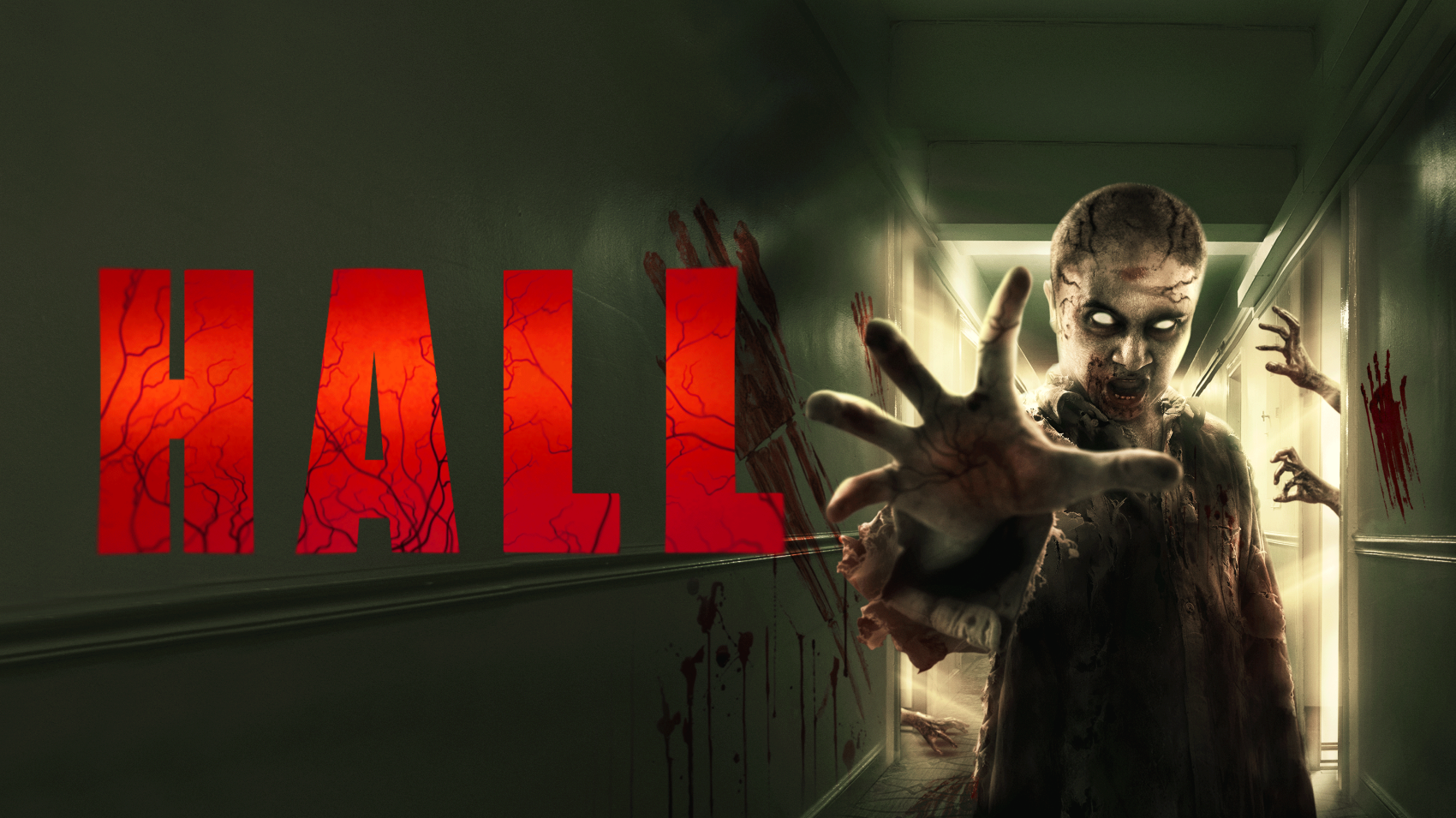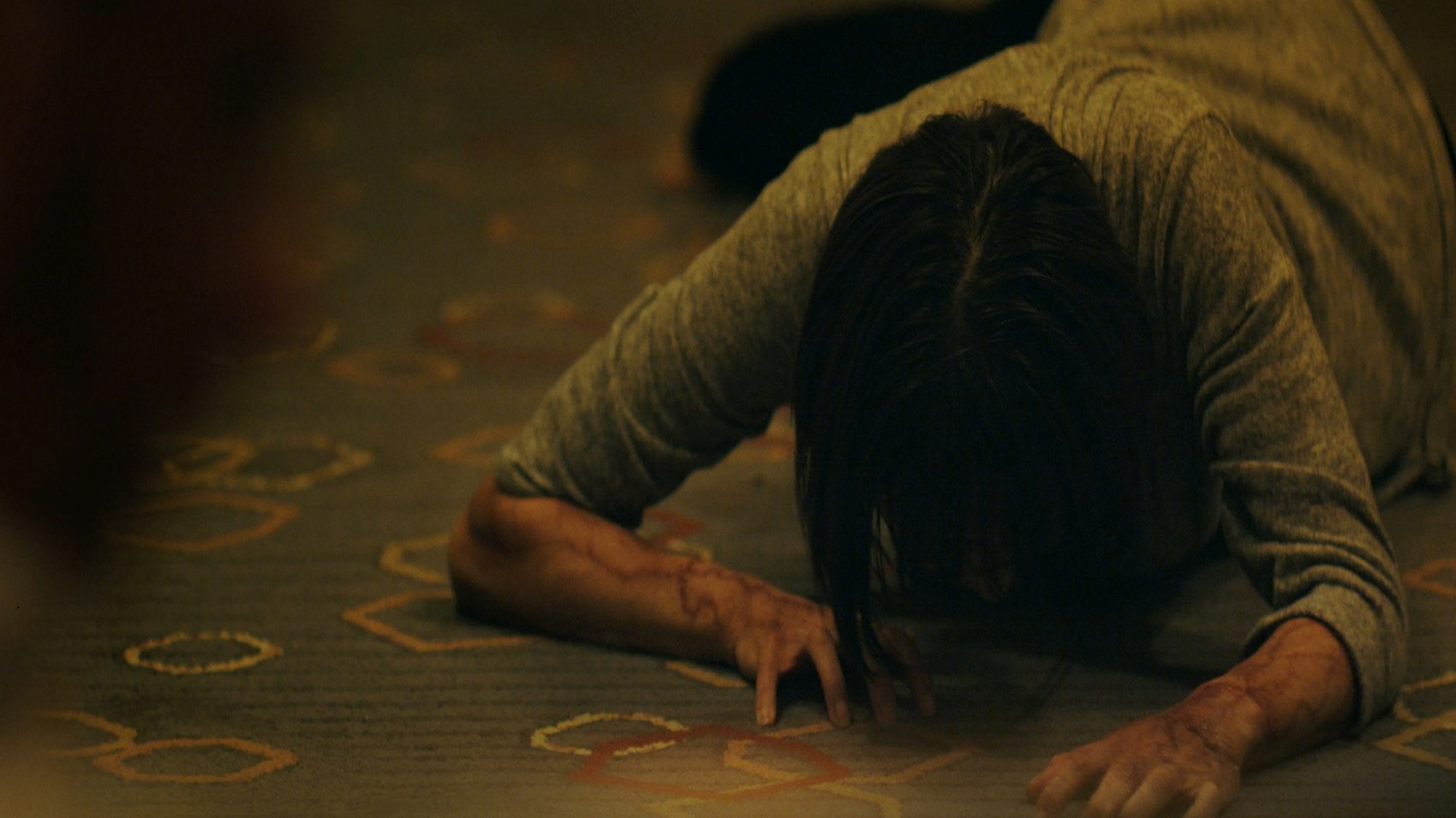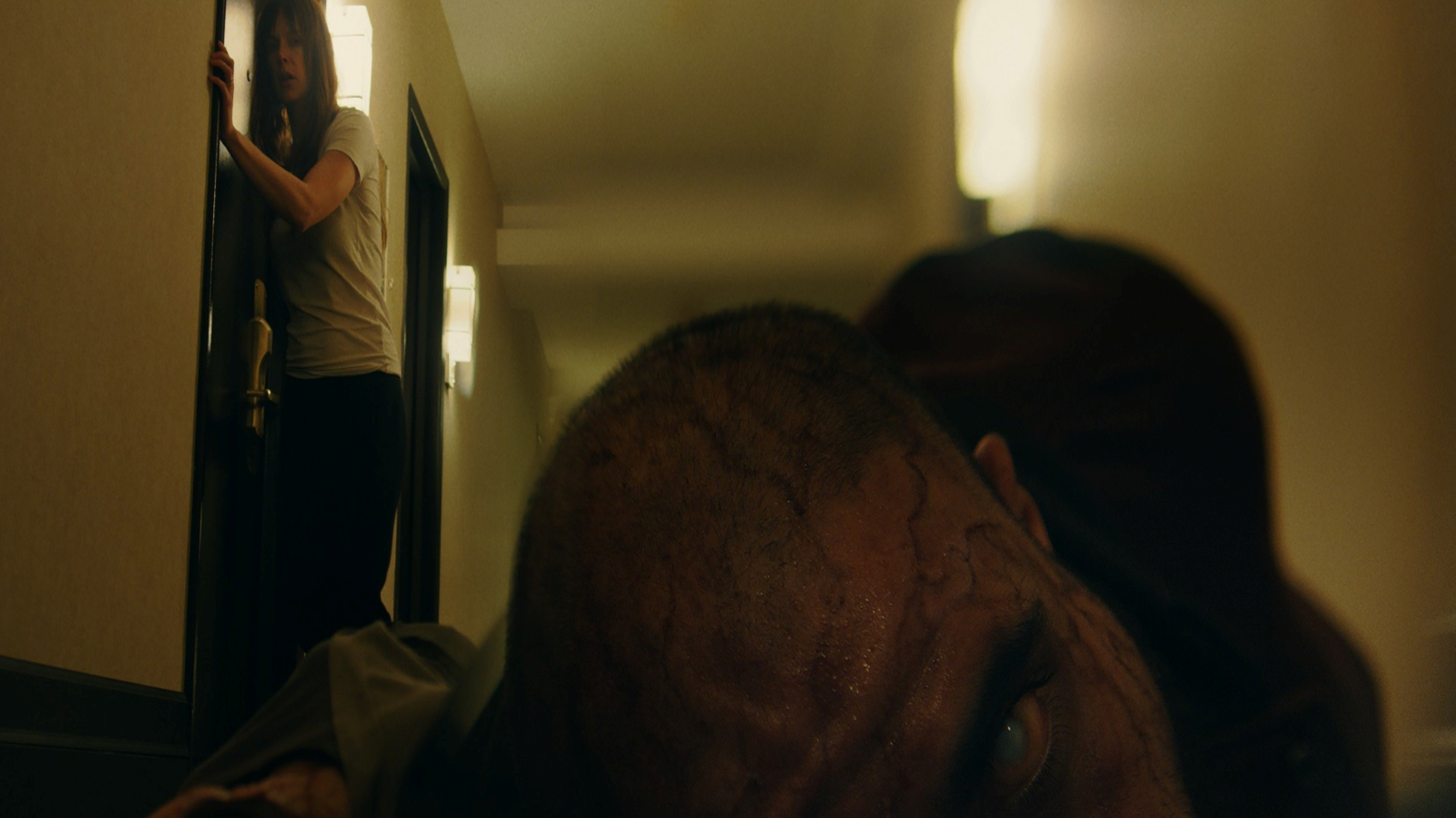[Film Review] Hall (2020)
Hall (2020) follows a group of strangers in a hotel, all with their own lives and problems, taken unawares by an unnamed virus. It’s a timely story! The film depicts what can happen when there is a deadly airborne virus to worry about, on top of the rest of your troubles.
We first hear of the virus on a car radio, as a family of three are driving to the hotel. Parents Val (Carolina Bartczak) and Branden (Mark Gibson), and their daughter Kelly (Bailey Thain), arrive at a luxurious hotel on a wintry night. Navigating the dark and the snow, Branden almost hits a pregnant woman with his car. That’s how we meet Naomi (Yumiko Shaku), who is alone at the hotel. Naomi and Val chat in the hallway, outside their rooms, and Naomi plainly says she is escaping her husband, who is a bad man. Val is understanding and doesn’t even flinch at the comment, and we soon learn why. Branden is mean and physically abusive. Both Naomi and Val are trying to protect their daughters, and meanwhile, hotel guests are starting to get sick.
There are frequent jumps back and forth in time, between seeing the guests settle into their rooms, and infected people crawling down the hallway. It’s easy to tell when someone is sick, because their veins bulge and skin starts to change color. They lose their voice and some of their mobility. A couple infected guests have violent outbursts before falling over again. It’s frightening to see someone go from normal and healthy to disintegrating so quickly, and the time jumps in this film brings that fear to the forefront. When the virus hits someone, it’s already too late. The unsettled feeling is enhanced by a somewhat unreliable narrator vibe. Sometimes it’s hard to tell if a character is hallucinating from stress or because they are sick with the virus, or if something supernatural is happening.
[image HALL 2]You could say this is a movie about an outbreak, and that would be true. But it’s also, if not moreso, a story about mothers protecting their daughters, and what they will risk for their daughters’ safety. Naomi wants to get her unborn daughter away from her husband, and we don’t hear the details, but from context we can assume he is not a safe man. We overhear a phone call between Naomi and her mother, in which her mother is insisting she come home to Japan, that Naomi will be safest with her own mother. Val has a similar conversion with her mom. It seems that Val has told her mother about Branden’s abuse, and she encourages Val to take Kelly and run. She even blames herself, saying she should have done a better job protecting Val. There are four mothers trying to save their daughters in this movie, and they all have slightly different ideas about what that means. The conversations feel very realistic - part chastising, part encouraging, in that way mother/daughter relationships can be.
Hall is also a profoundly revealing depiction of how cycles of abuse can continue. It can be easy to say, from the outside looking in, “why doesn’t she just leave her abusive relationship?” Well, Naomi did leave, she ran all the way across the world, but her mother points out how hard it could be to start over from scratch in a new country. Val seems torn about leaving, motivated to “keep her family together” as women are often pressured to do, and not take her daughter away from Branden. If Val just runs off with Kelly, she will be facing custody battles and legal charges. If those considerations weren’t enough, where can they safely run when there is a deadly airborne virus dropping everyone around them? It brings to mind the old saying, “out the frying pan, into the fire.”
[image HALL 3]While the film’s themes are the strongest part of the story, they also raise my points of criticism. The simplicity of the story doesn’t give much time to flesh out the characters other than putting them in boxes of “abused women and abusive men.” The women are only portrayed as mothers, not as whole people, and the men are villainous, whereas real-life abusers are often able to hide in plain sight. For the sake of telling the story in the time they have, the filmmakers passed on opportunities for nuanced character development. However, if you are willing to accept these simplistic characters at face-value, Hall has insightful points to make about cycles of power and control in abusive relationships.
The film offers a good reminder that sometimes our own problems can feel like the biggest problems in the world, even when we know they are not. In the midst of a deadly virus outbreak, Val and Naomi are focused on getting their children away from abusive men. And they might be prioritizing correctly. In the case of abuse, or the case of an invisible virus, sometimes we don’t know we’re in trouble until damage is already done, but that doesn’t mean it’s too late to protect yourself.







![[Film Review] V/H/S/85 (2023)](https://images.squarespace-cdn.com/content/v1/5fe76a518d20536a3fbd7246/1697455043249-K64FG0QFAFVOMFHFSECM/MV5BMDVkYmNlNDMtNGQwMS00OThjLTlhZjctZWQ5MzFkZWQxNjY3XkEyXkFqcGdeQXVyMTUzMTg2ODkz._V1_.jpg)
![[Film Review] Kill Your Lover (2023)](https://images.squarespace-cdn.com/content/v1/5fe76a518d20536a3fbd7246/1697465940337-T55VQJWAN4CHHJMXLK32/56_PAIGE_GILMOUR_DAKOTA_HALLWAY_CONFRONTATION.png)
![[Film Review] Shaky Shivers (2022)](https://images.squarespace-cdn.com/content/v1/5fe76a518d20536a3fbd7246/1696442594997-XMJSOKZ9G63TBO8QW47O/Screenshot+2023-10-04+at+18.59.33.png)
![[Film Review] Elevator Game (2023)](https://images.squarespace-cdn.com/content/v1/5fe76a518d20536a3fbd7246/1696440997551-MEV0YZSC7A7GW4UXM5FT/Screenshot+2023-10-04+at+18.31.42.png)
![[Film Review] A Wounded Fawn (2022)](https://images.squarespace-cdn.com/content/v1/5fe76a518d20536a3fbd7246/1695484054446-7R9YKPA0L5ZBHJH4M8BL/Screenshot+2023-09-23+at+16.42.24.png)
![[Film Review] Perpetrator (2023)](https://images.squarespace-cdn.com/content/v1/5fe76a518d20536a3fbd7246/1695483561785-VT1MZOMRR7Z1HJODF6H0/Screenshot+2023-09-23+at+16.32.55.png)
![[Film Review] Mercy Falls (2023)](https://images.squarespace-cdn.com/content/v1/5fe76a518d20536a3fbd7246/1695482997293-E97CW9IABZHT2CPWAJRP/Screenshot+2023-09-23+at+16.27.27.png)






















![[Editorial] 10 Films & Events to Catch at Soho Horror Film Fest 2023](https://images.squarespace-cdn.com/content/v1/5fe76a518d20536a3fbd7246/1700819417135-299R7L4P0B676AD3RO1X/Screenshot+2023-11-24+at+09.41.52.png)
![[Editorial] 9 Horror Nintendo Switch Games To Play](https://images.squarespace-cdn.com/content/v1/5fe76a518d20536a3fbd7246/1697214470057-3XZXX8N4LYIMDFWS6Z3P/Screenshot+2023-10-13+at+17.20.13.png)
![[Mother of Fears] Mothering in Silence in A Quiet Place (2018)](https://images.squarespace-cdn.com/content/v1/5fe76a518d20536a3fbd7246/1696445921315-HZJ2DZYQIH6VVWXBO2YL/Screenshot+2023-10-04+at+19.52.29.png)
![[Editorial] 5 Female Focused Horror Book Recommendations](https://images.squarespace-cdn.com/content/v1/5fe76a518d20536a3fbd7246/1696441981361-52EQCTJ7AT2QF1927GM7/919xtm6d3fL._AC_UF894%2C1000_QL80_.jpg)
![[Editorial] 9 Best Slashers Released Within 10 Years of Scream (1996)](https://images.squarespace-cdn.com/content/v1/5fe76a518d20536a3fbd7246/1695478839037-LOFHGVM3H6BMSZW7G83M/Screenshot+2023-09-23+at+15.15.11.png)
![[Mother of Fears] Mother Vs. Monster in Silent Hill (2006)](https://images.squarespace-cdn.com/content/v1/5fe76a518d20536a3fbd7246/1695485781119-H6GNP0G3J2TLPAOIABV7/Screenshot+2023-09-23+at+17.11.56.png)
![[Editorial] 9 Terrifying Cerebral Visions in Horror Movies](https://images.squarespace-cdn.com/content/v1/5fe76a518d20536a3fbd7246/1693509801235-X23OL50T1DVGECH0ZJK2/MV5BMjQ0MTg2MjQ4MV5BMl5BanBnXkFtZTgwMTU3NDgxMTI%40._V1_.jpg)
![[Mother of Fears] I Don’t Wanna Be Buried in a Pet Sematary (1989) and (2019)](https://images.squarespace-cdn.com/content/v1/5fe76a518d20536a3fbd7246/1691328766069-QFNAVJOMFZVZ5CLU1RWM/Screenshot+2023-08-06+at+14.23.13.png)

If you know me at all, you know that I love, as many people do, the work of Nic Cage. Live by the Cage, die by the Cage. So, when the opportunity to review this came up, I jumped at it.